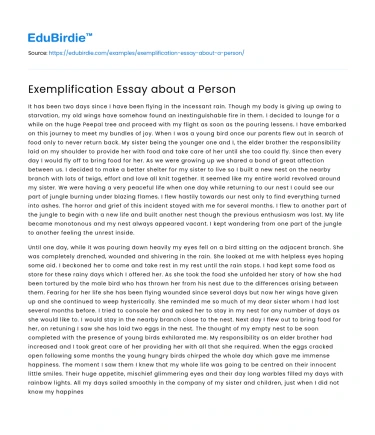Introduction
The impact of influential figures on society and individuals is a subject of great interest within the field of social sciences. Exemplification essays serve as a potent tool in understanding how certain individuals can shape cultural, ethical, and personal paradigms. In this discourse, we will focus on Mahatma Gandhi, whose legacy as a proponent of non-violence and civil rights has left an indelible mark on the global stage. His philosophy and methodologies continue to influence contemporary movements and ideologies. The examination of Gandhi's life and principles provides insights into how a singular person can mobilize masses and incite profound social change. This essay will explore the philosophical underpinnings of Gandhi’s non-violent resistance, his role in India's independence, and the global ramifications of his teachings. By addressing counterarguments and providing robust examples, the aim is to demonstrate the enduring relevance of Gandhi as an exemplary figure in modern history.
Gandhi's Philosophy of Non-Violence
Central to Gandhi's influence was his unwavering commitment to the principle of ahimsa, or non-violence. As elucidated by Raghavan Iyer in "The Moral and Political Writings of Mahatma Gandhi," this doctrine was more than a mere strategy; it was a way of life, deeply rooted in ancient Indian traditions and spiritual beliefs (Iyer, 1986). Gandhi’s interpretation of non-violence extended beyond physical abstinence from violence to include the renunciation of hatred and hostility. This philosophy was most prominently demonstrated during the Salt March of 1930, a non-violent protest against the British salt tax. As noted by historian Judith Brown, the march galvanized Indian society across various socio-economic strata, highlighting the power of peaceful resistance (Brown, 1991).
Save your time!
We can take care of your essay
- Proper editing and formatting
- Free revision, title page, and bibliography
- Flexible prices and money-back guarantee
However, critics argue that non-violence is an impractical approach against oppressive regimes that do not hesitate to employ force. Despite these criticisms, Gandhi’s success in India’s independence movement provides a compelling counter-narrative. According to Erik Erikson in "Gandhi's Truth," non-violence was not merely a passive resistance but an active force of moral confrontation, forcing oppressors to reconsider their actions (Erikson, 1969). This transformative power of non-violence, as demonstrated by Gandhi, has been emulated by numerous leaders, including Martin Luther King Jr. and Nelson Mandela, in their respective struggles for civil rights and equality.
The Role in India's Independence Movement
Mahatma Gandhi's contribution to India's independence is a testament to his exemplary leadership and strategic acumen. His ability to mobilize millions under the banner of non-violence was instrumental in India’s liberation from British rule. The Quit India Movement of 1942, as detailed by Bipan Chandra in "India's Struggle for Independence," exemplifies Gandhi's tactical foresight and his ability to inspire collective action (Chandra, 1989). Gandhi's emphasis on self-reliance and economic independence, through initiatives like the promotion of khadi, not only challenged colonial economic structures but also instilled a sense of national pride and unity.
Opponents of Gandhi’s methods often cite the partition of India as a failure of his vision, suggesting that his inability to prevent communal violence undermined his leadership. Yet, Gandhi’s relentless advocacy for Hindu-Muslim unity and his fasting unto death to quell riots in Calcutta are poignant reminders of his commitment to peace and harmony. As Ramachandra Guha argues in "Gandhi: The Years That Changed the World," Gandhi’s efforts, though not flawless, laid the groundwork for democratic and pluralistic values in India (Guha, 2018). His influence on the Indian Constitution, particularly the inclusion of fundamental rights and the emphasis on secularism, underscores his lasting impact on the nation’s democratic framework.
Global Ramifications of Gandhi's Teachings
The global influence of Gandhi’s teachings is evident in various movements that have drawn inspiration from his principles of non-violence and civil disobedience. The American Civil Rights Movement, led by Martin Luther King Jr., is a prominent example where Gandhi’s methods were adapted to challenge racial segregation and discrimination. In his "Letter from Birmingham Jail," King explicitly acknowledges Gandhi’s influence, stating that non-violent resistance was a means to “create such a crisis and foster such a tension” that forces a community to confront injustice (King, 1963).
Additionally, in South Africa, Nelson Mandela's long struggle against apartheid drew heavily on Gandhian strategies. As Mandela himself noted in his autobiography "Long Walk to Freedom," Gandhi's ability to unite people across divides through peaceful means provided a blueprint for his own efforts (Mandela, 1994). Despite cultural and contextual differences, the universal applicability of Gandhi's teachings highlights their potency in addressing systemic injustices worldwide.
Conclusion
In conclusion, Mahatma Gandhi exemplifies the profound impact an individual can have on both national and global scales. His unwavering dedication to non-violence and his strategic prowess in leading India to independence underscore his role as an inspirational figure. While criticisms of his methods and their outcomes exist, the enduring legacy of Gandhi’s teachings in various socio-political movements attests to their effectiveness and relevance. As societies continue to grapple with issues of inequality and oppression, Gandhi’s life and philosophy offer valuable lessons in moral courage and the power of peaceful resistance. Through a detailed examination of his principles and their application, it becomes evident that Gandhi’s influence transcends time and geography, cementing his status as a pivotal figure in the annals of history.






 Stuck on your essay?
Stuck on your essay?

